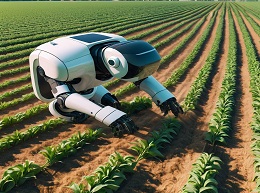AI in Agriculture: Enhancing Crop Yield and Sustainability

In an era marked by population growth and environmental challenges, the agricultural industry faces increasing pressure to produce more food sustainably. Artificial Intelligence (AI) is emerging as a transformative tool in this endeavor, revolutionizing farming practices and contributing to enhanced crop yield and sustainability.
Precision Agriculture: Maximizing Efficiency
Precision agriculture leverages AI technologies to analyze vast amounts of data, including soil quality, weather patterns, and crop health, to optimize farming practices with unprecedented precision.
Example: Crop Monitoring with Drones
Drones equipped with AI-powered cameras can capture high-resolution images of fields, enabling farmers to monitor crop health, detect diseases, and assess nutrient deficiencies with precision. This real-time data facilitates targeted interventions, such as precise irrigation and fertilizer application, improving crop yield while minimizing resource wastage.
Predictive Analytics: Anticipating Challenges
AI algorithms process historical data and real-time inputs to predict future outcomes, empowering farmers to anticipate challenges and make informed decisions.
Example: Weather Forecasting
AI-driven weather forecasting models analyze historical weather data alongside current atmospheric conditions to predict weather patterns with greater accuracy. By anticipating extreme weather events or seasonal changes, farmers can adjust planting schedules, irrigation plans, and crop protection strategies, mitigating risks and optimizing yield.
Crop Management: Tailored Solutions
AI-powered systems offer tailored solutions for crop management, addressing specific needs at various stages of the agricultural lifecycle.
Example: Weed Detection and Management
AI algorithms can differentiate between crops and weeds in real-time, enabling precision spraying of herbicides only where needed. This targeted approach minimizes chemical usage, reduces environmental impact, and ensures optimal crop health, contributing to sustainable farming practices.
Soil Health Monitoring: Enhancing Fertility
Soil health is critical for crop productivity and long-term sustainability. AI technologies enable continuous monitoring of soil quality, facilitating timely interventions to maintain fertility and optimize nutrient levels.
Example: Soil Sensors
AI-driven soil sensors measure key parameters like moisture content, pH levels, and nutrient concentrations in real-time. By analyzing this data, farmers can adjust irrigation schedules, optimize fertilizer application, and implement soil conservation practices, ensuring healthy soil and sustainable crop production.
Supply Chain Optimization: Reducing Waste
AI streamlines supply chain operations, minimizing waste and ensuring efficient distribution of agricultural products from farm to fork.
Example: Predictive Harvesting
AI algorithms analyze crop maturity data, weather forecasts, and market demand to predict optimal harvesting times. By harvesting crops at peak ripeness, farmers can minimize post-harvest losses, reduce food waste, and deliver fresher produce to consumers, enhancing economic viability and sustainability.
Challenges and Opportunities
While AI holds immense potential for transforming agriculture, challenges such as data privacy, access to technology, and adoption barriers in rural areas must be addressed. Collaboration among stakeholders, including farmers, researchers, policymakers, and technology providers, is essential to harnessing the full potential of AI in agriculture and ensuring its benefits are equitably distributed.
Conclusion: A Sustainable Future
AI is reshaping agriculture, offering innovative solutions to address the challenges of feeding a growing population while safeguarding the environment. By leveraging AI technologies for precision agriculture, predictive analytics, crop management, soil health monitoring, and supply chain optimization, farmers can enhance crop yield, reduce resource consumption, and promote sustainability in farming practices.
In conclusion, AI represents a powerful ally in the quest for a sustainable future in agriculture. As technology continues to advance and adoption grows, AI-driven innovations will play an increasingly vital role in ensuring food security, environmental conservation, and economic prosperity for generations to come.